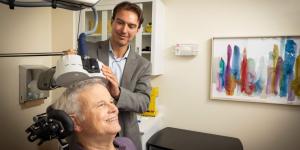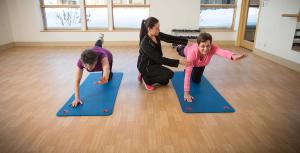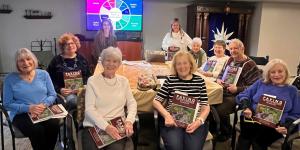Lost Without Your GPS? The Connection Between Navigation Skills and Brain Health
Learn how GPS usage and memory are related and tips to keep your brain healthy.

For many of us, entering our destination into a GPS is a given whenever we get into the driver’s seat. Often, that rings true even if we know where we’re headed! GPS technology offers a convenient way to get from one place to another without getting lost along the way. But did you know that your navigation skills and brain health are connected?
In 2000, a now-famous study looked at the brains of licensed London taxi drivers and found something fascinating. Imaging of their brains showed significantly larger posterior hippocampi — the part of the brain involved in memory — than non-taxi drivers. What was unique about London taxi drivers was the extensive training they received for their jobs. To become licensed, they had to learn to navigate around thousands of locations throughout the city.
The hippocampus is a structure in our brains that is key for memory formation and processing. Beyond that, one of its important jobs is helping us navigate the world around us. For those taxi drivers, continually relying on their navigation skills to make their way around London actually caused their hippocampi to grow.
But what happens when we don’t keep those skills sharp? With GPS available in the palm of our hands, it’s often easier to let technology do the work for us. While using GPS isn’t necessarily harmful to your brain, it may make you more vulnerable if you develop conditions that affect your hippocampus, such as Alzheimer’s disease. Here’s what you need to know:
How our brains help us navigate
The hippocampus is special. It enables us to remember places and navigate through space because it contains “place cells” that fire when we reach a location. Thanks to these cells, we can find locations again and again.
Research has shown that place cells and memory are closely connected. Place cells help us remember past places, recognize our current location, and map out and plan future locations.
Our brains use two main strategies for spatial processing, which is how we figure out where things are in the world, including ourselves:
- Allocentric navigation depends on a big-picture understanding of the environment and how different landmarks relate. When using allocentric navigation, our brains create a “cognitive map” of the world around us.
- Egocentric navigation is less about the big picture and more about what’s immediately around us. An example of egocentric navigation is following turn-by-turn directions given by a GPS.
Does GPS usage affect brain health?
When we reach for our GPS and follow turn-by-turn directions, we aren’t relying on the cognitive maps our brains can create. Instead, we’re leaning more toward egocentric navigation. Because of that, our hippocampi don’t have to do much work to help us make our way around.
A number of studies have explored the link between cognitive abilities and the use of GPS. For example, scientists tested a group of young individuals and retested them three years later. They found that study participants who reported high GPS usage since the initial round of testing showed a substantial decline in spatial memory. Basically, as we now know well, “use it or lose it” seems to hold true for the brain. If we do not practice navigation skills because we rely on the GPS, our navigation abilities will suffer. With that, the part of the brain that is critically involved in navigation — the hippocampi — will shrink.
However, let’s be clear: GPS usage won’t cause you to develop Alzheimer’s disease or dementia.
Nonetheless, if you do develop Alzheimer’s disease and have relied heavily on your GPS without prioritizing your brain health, you could be more likely to show symptoms like memory loss or visuospatial difficulties sooner or more severely. Why? Because your hippocampus, which is crucial for memory and navigation, hasn’t been getting much exercise!
But don’t worry — that doesn’t mean I’m suggesting you give up your GPS. There are other, more practical ways you can keep your brain healthy.
You don’t have to stop using your GPS
GPS technology offers many benefits, letting us explore new places without getting lost. In addition to aiding those of us who are prone to getting turned around, it can benefit those affected by dementia.
More specifically, having a GPS can allow those with conditions that affect the ability to remain oriented, including Alzheimer’s disease and other forms of dementia, to maintain their independence for longer. Driving remains possible for some older adults in the earlier stages of Alzheimer’s disease, and a GPS can be a valuable tool for reaching their destination safely.
Rather than advising against using this helpful technology, it’s important to acknowledge what it supports us with — not getting lost on the way to work — and what it doesn’t — keeping our brains active and engaged. So, how do we combat that loss of engagement?
How to keep your brain healthy
With the invention of driving, humans gained the convenience of having a quick drive home instead of a long walk. We lost a lot of physical activity as a result. The solution to that was to find other ways to exercise our bodies. The solution to GPS reliance? Finding other ways to exercise our brains!
Consider completing puzzles or playing games that involve finding your way around or navigating. If you’re looking for a fun activity outside the house, you could plan a scavenger hunt in your town or city. You can create your own, but if you live in a major city like Boston, you may be able to find printable scavenger hunts online. Anything that stimulates your brain and gets you thinking can be helpful — it doesn’t have to be as physically demanding and adventurous as a scavenger hunt.
It’s about more than just brain games. Lifestyle factors like diet, exercise, sleep, socialization, and ongoing learning also contribute to maintaining brain health.
For more tips on keeping your brain healthy, our blog post on my six pillars of brain health dives deeper into some of the key modifiable lifestyle factors that you can prioritize.
Outpatient memory care at Hebrew SeniorLife
If you’ve always been the type to get turned around, you may not have anything to worry about. But if you or a loved one starts to struggle with directions or orientation when you never used to, it could be a sign that something more serious is occurring. Similarly, if you now struggle to use your GPS when you used to be able to enter and follow directions without issue, that can also be an early sign of cognitive problems that warrant evaluation.
At the Deanna and Sidney Wolk Center for Memory Health, we conduct comprehensive evaluations, including visual-spatial testing, as part of our neuropsychological testing. As an outpatient memory clinic, we specialize in providing comprehensive care related to brain health, cognitive and behavioral problems, and memory loss.
If you or a loved one have noticed memory changes you are concerned about, please reach out. The earlier you seek care, the more options you have for treatment and lifestyle interventions. Call our office today at 617-363-8600 or contact us online.
Join Our Community: Subscribe to the Hebrew SeniorLife blog for weekly insights on healthy aging and senior living.
Blog Topics
Learn More
Memory Care
Our care team helps people with advanced Alzheimer's disease and other forms of dementia feel safe and stimulated, while maintaining a connection to community.




